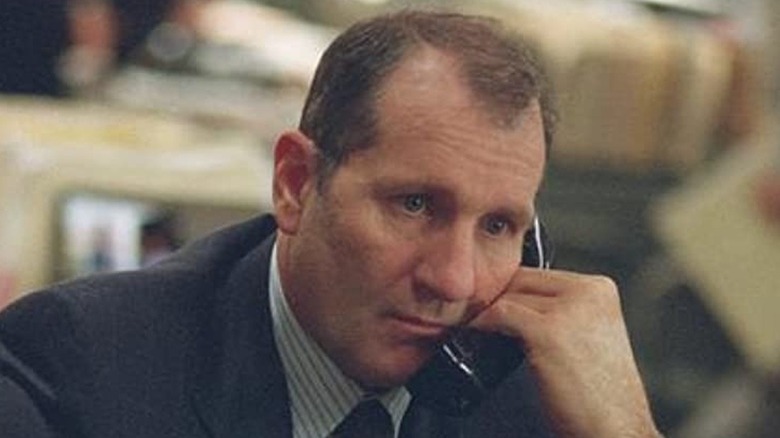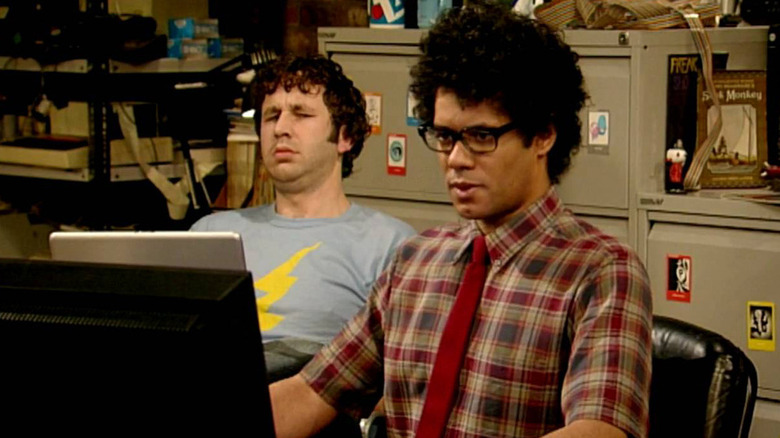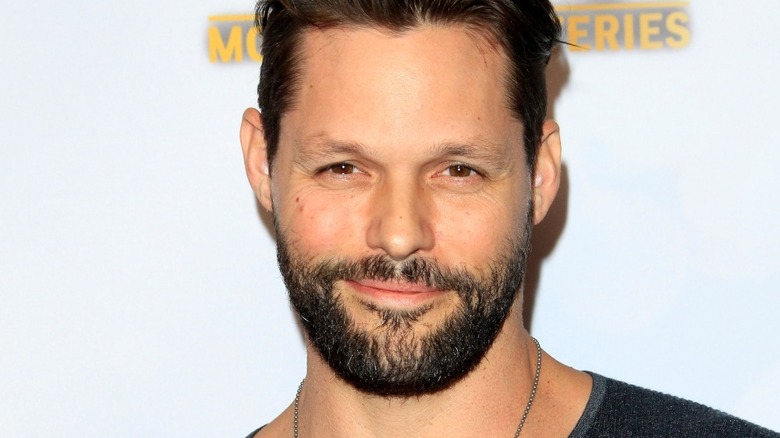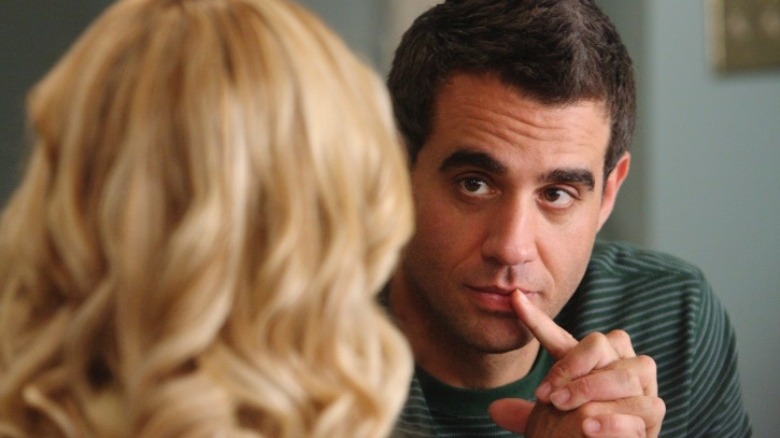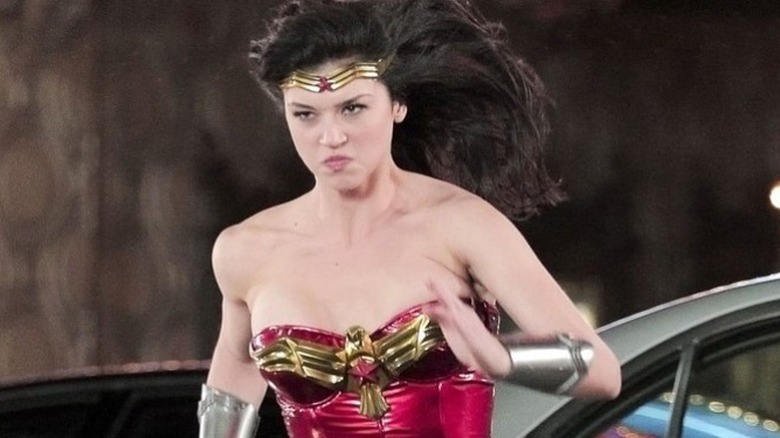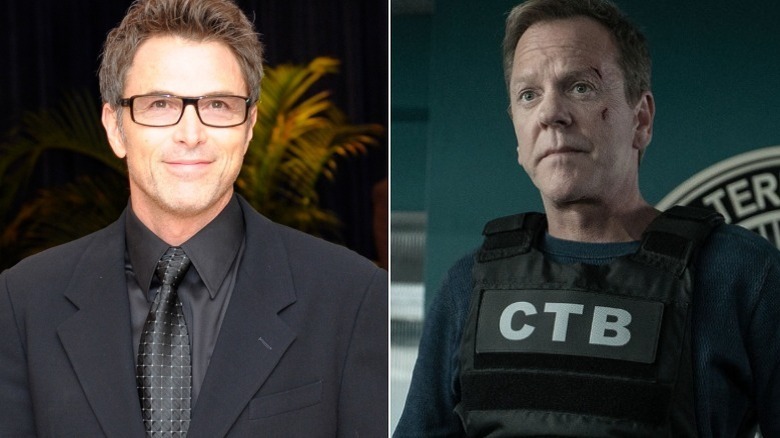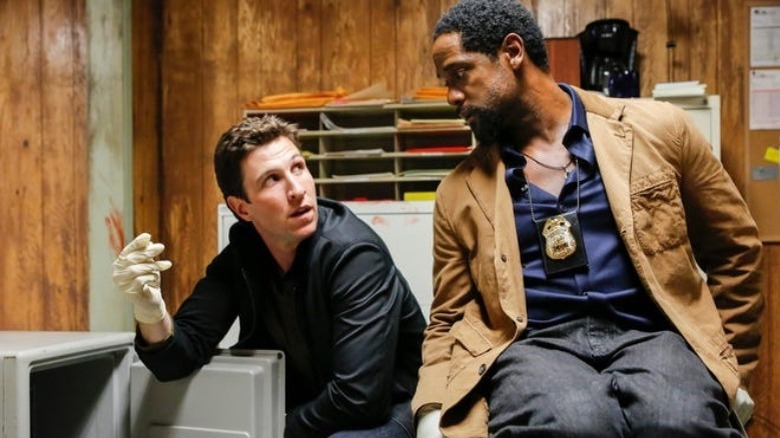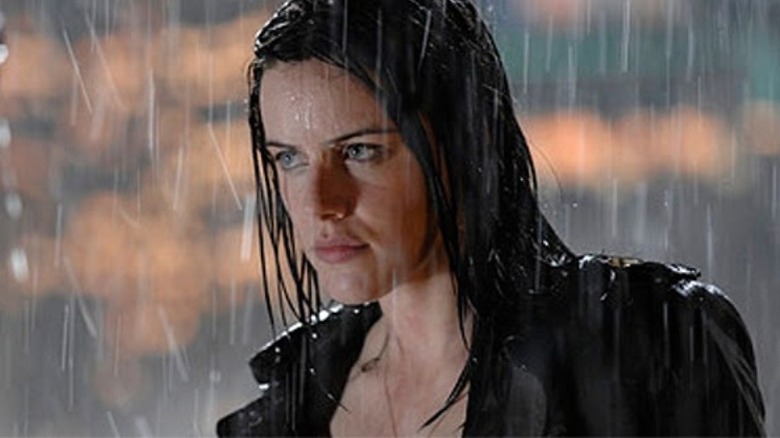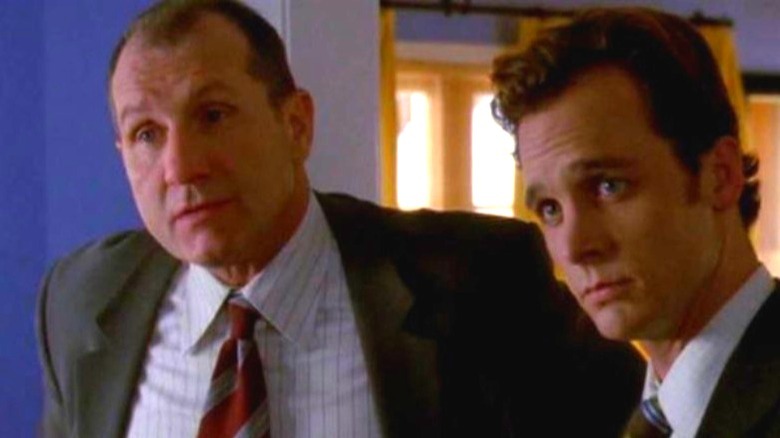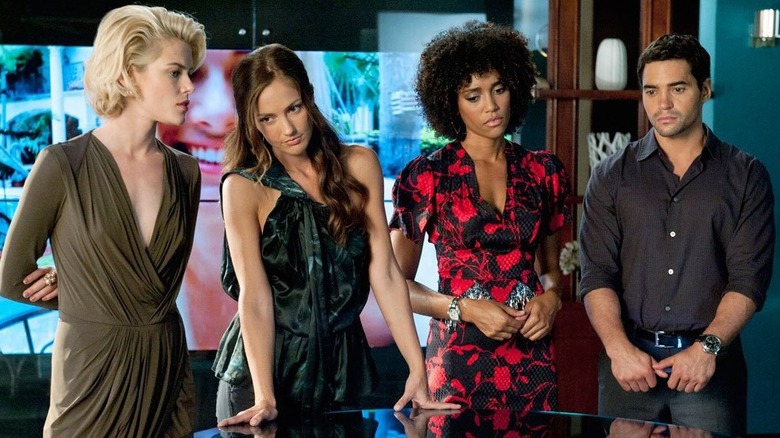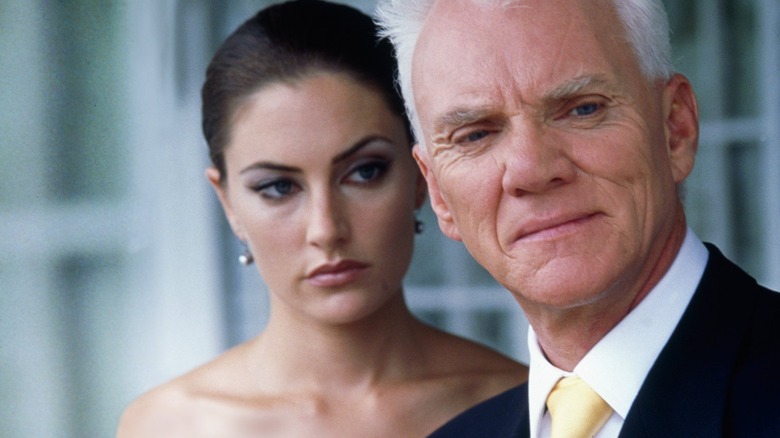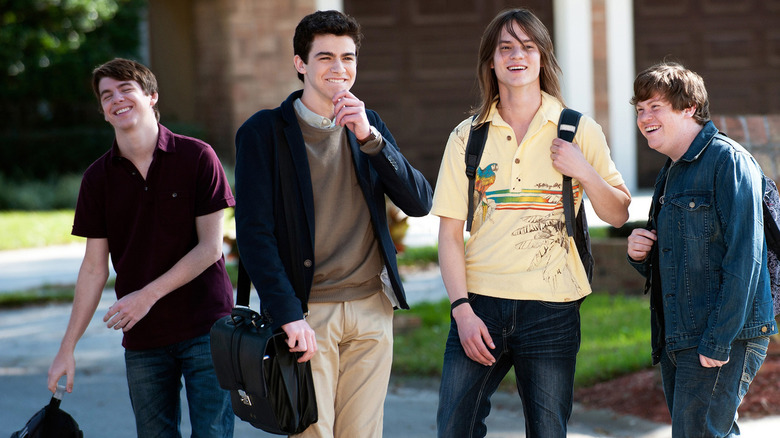TV Reboots No One Wanted
Sometimes when it comes to finding success on television, starting all over again from scratch is precisely what the doctor ordered. As much as some of us might complain about what can seem like an unending stream of remakes, reboots, and revivals, it isn't a mystery why the old concepts keep getting revisited — because people tune in to watch. CBS' "Hawaii Five-0" revival lasted almost as long as the original, ABC's "MacGyver" reboot performed similarly, and SyFy's "Battlestar Galactica" proved much more successful than its late '70s predecessor.
But sometimes the person who groans every time they hear about yet another rebooted program has good reason to whine. Sometimes a beloved series is so good it just can't be topped, and trying will do nothing but chip away at the audience's fond memories of the original. Sometimes series are successful in other countries, but once Hollywood gets ahold of the idea and tries to Americanize it, they dismantle everything that made the story appealing in the first place. And still other times a network inexplicably takes a chance on rebooting a series that didn't even do well the first time.
Whether they're sitcoms, alien invasion epics, or superhero adventure dramas, here are the TV reboots that nobody wanted.
Networks may want to stop trying to turn The IT Crowd off and on again
On the popular British sitcom "The IT Crowd," it's a regular gag for the work-allergic Roy (Chris O'Dowd) to immediately answer every computer complaint with, "Have you tried turning it off and on again?" Well, here in America, NBC has been following his advice — but with the series rather than a computer — and so far it hasn't worked.
The original series ran on BBC Four from 2006 to 2010, plus a 2013 special that acted as a series conclusion. The sitcom proved to be a game changer for the careers of O'Dowd and Richard Ayoade — who plays Roy's nerdier co-worker Maurice — and has grown in popularity far beyond the shores of England.
There were plans to remake "The IT Crowd" in the States even before the original series concluded. In 2007, a pilot episode was filmed with Joel McHale replacing O'Dowd as Roy, Jessica St. Clair playing Jen, and Ayoade reprising the role of Maurice. While it was ordered to series, in September 2007, THR reported those plans were scrapped because incoming NBC chairman Ben Silverman was unhappy with it.
News of a second attempt to Americanize the sitcom broke in October 2014, but a pilot never materialized. The latest word comes from 2017, with NBC making a third endeavor to remake the series, and for the first time, they've recruited the original series' creator — Graham Linehan — to help.
The new Knight Rider had nothing under the hood
Premiering in 1982 on NBC, the action drama "Knight Rider" remains one of the most iconic TV series of the '80s. Starring David Hasselhoff as Michael Knight, "Knight Rider" delivered weekly adventures with Knight at the wheel of his talking car KITT (Knight Industries Two Thousand), voiced by William Daniels. NBC wasn't quite done with the concept when the series shuttered in 1986. The 21st century proved the legacy of Michael Knight and KITT couldn't be killed forever, as much as it probably should've been, with the 2008 "Knight Rider" TV movie serving as a backdoor pilot for a new series.
Not strictly a reboot but a sequel series, the 2008 "Knight Rider" stars Justin Bruening as Mike Traceur, who renames himself Michael Knight II. Rather than a Trans Am, the new KITT is a Ford Mustang capable of transforming into other vehicles and voiced by Val Kilmer.
Lasting only 17 episodes, the '00s' "Knight Rider" enjoys an abysmal 5% approval rating on Rotten Tomatoes. Reading through reviews leaves you with the unmistakable consensus that the new series is all flash with nothing of substance. It shows as much skin as it can get away with on network TV, steals liberally from "James Bond," and offers a mess of what THR's Ray Richmond called "gadgetry, visual FX, holograms and sophisticated imagery" rather than story value. Richmond goes on to complain about Kilmer's voicing of KITT, comparing Kilmer's "dispassionate loquaciousness" to the A.I. monster HAL 9000 from "2001: A Space Odyssey."
Cupid's second arrow didn't hit any closer to the mark
In a weird way, the original "Cupid" is kind of like the network dramedy version of 2010's "Thor." Just as the Marvel hero and God of Thunder is banished from Asgard and stripped of his powers until he proves his worthiness, "Cupid" lead Trevor Hale (Jeremy Piven) believes he is the ancient love god Cupid and that Zeus has punished him by throwing him out of Olympus and tasking him with uniting 100 romantic couples — without the use of his powers — before he can return home.
If you've never heard of the original "Cupid" or the reboot, you're not alone. Created by Rob Thomas of "Veronica Mars" fame, the first version of the dramedy "Cupid" premiered in 1998, and only 15 episodes aired before it was cancelled in 1999.
Ten years later, ABC apparently agreed that there was something to be salvaged from "Cupid" and rebooted the series with Thomas still attached and Bobby Cannavale in the lead role of Trevor, though his last name is changed to Pierce. Like his predecessor, Pierce is a bartender but in New York City instead of Chicago. Unfortunately, the reboot didn't last even half as long as the original. Its cancellation was confirmed only two months after its premiere, and only seven episodes aired.
The 2011 Wonder Woman reboot never saw the air
A lifelong fan of superheroes, Adrianne Palicki has done her share of comic book-related TV work. One of her earliest acting credits is a one-off on "Smallville," she's the villain Nadia in the 2006 dead-end "Aquaman" backdoor pilot, and she would go on to play Bobbi Morse — better known to Marvel Comics fans as Mockingbird — in "Agents of S.H.I.E.L.D." Palicki almost had another big mark in her geek cred checklist as Lynda Carter's successor in NBC's new "Wonder Woman," but it wasn't meant to be.
Palicki's version of the iconic DC Comics heroine enjoys not one but two alter-egos — she fights for justice as Wonder Woman; as Diana of Themyscira, she's the CEO of Themyscira Industries, where she markets her own image as Wonder Woman; and as Diana Prince, she carves out as much of a private, "normal" life as she can manage. If you haven't seen the pilot, you aren't alone, because it never aired.
Speaking to EW in 2020, Palicki said the news that NBC wasn't picking up the series was "devastating." She said she wasn't sure why the pilot failed to impress but speculated about the timing. The pilot was ordered the same year "Smallville" ended and a year before the debut of "Arrow," which would go on to spawn a slew of DC Comics-inspired series for The CW. Palicki told EW, "I feel like maybe if it had been [made] one or two more years [later], it would've been a shoo-in."
The Fugitive keeps trying to get away with murder
Beginning as a successful '60s crime drama, "The Fugitive" would later be adapted to the big screen with Harrison Ford playing the wrongly convicted Dr. Richard Kimble and Tommy Lee Jones pursuing him as U.S. Marshal Gerard. But that was hardly the end of the remakes.
In 2000, CBS brought "The Fugitive" back to television with Tim Daly playing Kimble, Mykelti Williamson as Gerard, and Stephen Lang as the infamous One-Armed Man. CBS canceled the reboot after only one season, ending the story on a cliffhanger.
Twenty years later, the short-lived streaming service Quibi remade "The Fugitive" with a new concept and new characters. Instead of Dr. Richard Kimble, Boyd Holbrook plays Mike Ferro, a blue-collar worker wrongly believed to have detonated a bomb in the L.A. subway tunnels. Unlike Kimble, Ferro is never convicted in a court of law, but the speed and reach of social media has him convicted in the court of public opinion. He's pursued by Kiefer Sutherland as the legendary policeman Clay Bryce.
The series was no more beloved than Quibi's other offerings, as evidenced by its embarrassing 20% approval rating on Rotten Tomatoes. EW's Darren Franich seemed to hilariously sum up the critical consensus by writing, "It looks like it cost a lot. Sometimes you spend money wisely, and sometimes you blow it out of somewhere."
The Ironside reboot was controversial and unremarkable
In October 2013, the crime drama "Ironside" premiered on NBC with Blair Underwood as police detective Richard T. Ironside — a role previously made famous by Raymond Burr in the original series, which aired on NBC from 1967 to 1975. Like the retired police chief Burr plays in the original, Underwood's hero is a police detective paralyzed from the waist down after being shot.
Before it even made it to air, "Ironside" faced controversy with the casting of an able-bodied actor in the role of a disabled person. Speaking to The Wrap in May 2013, Kurt Yaeger — who played Greg the Peg on "Sons of Anarchy" — went so far as to liken the casting to "being in the '50s and having a white guy do blackface." Two months later, "Ironside" executive producer Teri Weinberg defended the casting by explaining that the series would include flashbacks from before the detective's injury, which meant hiring an actor who could 'be on their feet' for those scenes.
Regardless of the controversy, the "Ironside" reboot didn't survive. With critics — and apparently audiences — agreeing that it was largely what E! Online's Jenna Mullins called "just another police procedural," the series was canceled the same month it premiered, with only four episodes making it to the air.
Lukewarm reviews and the writers' strike killed Bionic Woman
In 1976 "The Bionic Woman" premiered on ABC with Lindsay Wagner playing Jaime Sommers, the eponymous enhanced heroine. Wagner originated the role on the sci-fi action series "The Six Million Dollar Man," starring Lee Majors as the titular cyborg. Along with three seasons of her own series, Wagner went on to guest star as Sommers in episodes of "The Six Million Dollar Man," as well as reprising the role for a number of TV movies alongside Majors.
But when NBC rebooted the concept with "Bionic Woman" in 2007, it was English actress Michelle Ryan taking on the role. Rather than a tennis player like Wagner's version, the new Sommers is a bartender who is saved after a car accident with bionic implants made by the Berkut Group, who she works for after she recovers. Her enhancements include improved sight, hearing, strength, and healing.
"Bionic Woman" started out fairly strong, pulling in close to 14 million viewers with the series premiere — numbers NBC hadn't seen since the premiere of "The West Wing" in 1999. While the premiere enjoyed a huge audience, the series suffered a steep drop-off. The critical response was mixed, and the 2007-8 Writers Strike stopped any momentum "Bionic Woman" had left, with production on the series halting in November 2007. The following month, the series was canceled after airing only eight episodes.
Dragnet couldn't capture the ratings
The "Dragnet" franchise is more extensive than you may realize. Before Jack Webb ever appeared on TV as the iconic Detective Joe Friday who famously asked for "just the facts," he was the voice of Friday on a radio series beginning in 1949. The first TV series premiered in 1951 starring Webb, and he reprised the role for the revival series "Dragnet 1967," as well as a number of movies.
Dan Akroyd stepped into Webb's shoes for the 1987 comedy adaptation "Dragnet" alongside Tom Hanks as his partner, and two years later, the short-lived "The New Dragnet" series premiered with Jeff Osterhage and Bernard White as a completely new pair of detectives.
The most recent attempt to cash in on the popularity of "Dragnet" came in 2003, produced by "Law & Order" creator Dick Wolf. The new "Dragnet" premiered on ABC starring Ed O'Neill of "Married... with Children" fame as Joe Friday and Ethan Embry as Friday's partner Detective Frank Smith.
"Dragnet" is one of the few examples on this list of a series that enjoyed more than one season, but not by much. The first season was 12 episodes long, and the ratings were discouraging enough that the entire format was revamped and the series rebranded "L.A. Dragnet." Season 2 focused on a new, younger, and more ethnically diverse cast, with O'Neill enjoying less screen time. The makeover clearly wasn't enough, because "L.A. Dragnet" got the ax with only five of its Season 2 episodes making it to air.
Charlie's Angels couldn't find their wings
While 2019's "Charlie's Angels" was a box office bomb none of the angels could've defused, it wasn't the first time the franchise fell on its face. In 2011, ABC rebooted "Charlie's Angels" with Al Gough and Miles Millar — who were just coming off their decade-long run on "Smallville" — developing the series. Minka Kelly plays street racer Eve, Annie Ilonzeh is the former cop Kate, and Rachael Taylor is the former thief Abby. Helping the Angels, as always, is Bosley (Ramon Rodriguez), reinvented for the 21st century as a hacker, while Victor Garber voices the faceless Charlie.
The original "Charlie's Angels" aired for five seasons between 1976 and 1981. The new series flew nowhere near as high. In October 2011, the reboot was canceled only four episodes into its first season, and only three more episodes limped through the schedule before disappearing for good.
If anyone was surprised by the news, it wasn't EW's Ken Tucker. A month before "Charlie's Angels" was canceled, Tucker wrote a dismissive review of the new show. In particular, Tucker seemed disappointed that the reboot took more inspiration from the movies than the original series, and so came off more like a spoof with bad dialogue. He ended by casting serious doubt the series could last against popular series like "Community" and "The Big Bang Theory" and ended up being right.
The new Fantasy Island couldn't stay afloat
In 1977, the late Ricardo Montalbán originated the role of the mysterious Mr. Roarke for ABC's fantasy drama "Fantasy Island." Often accompanied by his sidekick Tattoo (Hervé Villechaize), Roarke would always greet guests in a white suit before exposing them to a "fantasy" that would ultimately take a left turn in order to teach the guest an important lesson.
While the original show hints at the supernatural origins of Roarke and his island, which slowly become more apparent later in the series, in the 1998 reboot, the supernatural elements are anything but subtle. Malcolm McDowell takes over the role of Roarke, and his second-in-command Ariel (Mädchen Amick) regularly and obviously shape-shifts into the forms of other women.
The reboot also wasn't subtle about differentiating itself from its source material. While Montalbán always wears a white suit as Roarke, in the reboot's premiere episode, McDowell's Roarke picks a black suit out of a closet otherwise full of white ones and afterward orders all the white suits destroyed.
Unfortunately, the new "Fantasy Island" got a lot fewer visitors than its predecessor, and the reboot was canceled midway through its first season. It appears that isn't the end for the franchise, though. In 2020, Michael Peña played Roarke in a horror film version of "Fantasy Island," and Fox is rebooting the series once more, with Roselyn Sánchez starring as Roarke's descendant.
The Inbetweeners couldn't find a place in America
Starring Simon Bird as Will Mckenzie — who's joined by his friends Simon, Neil, and Jay — the British coming-of-age sitcom "The Inbetweeners" was a hit across the pond. The series ran from 2008 to 2010, and led to both 2011's "The Inbetweeners Movie" and 2014's "The Inbetweeners 2."
In 2008, ABC announced it was tired of Britain having all the fun and planned to remake "The Inbetweeners" for American audiences. Those plans were never realized, but the New World wasn't done with the series just yet. "Arrested Development" writer Brad Copeland jumped on board to develop an American reboot for MTV, while Taika Waititi was tapped to direct the pilot. The first season aired in August 2012, with Joey Pollari playing the role of Will McKenzie.
In November 2012, MTV announced there would be no Season 2 for "The Inbetweeners." Deadline put the blame on the network, saying that while the reboot enjoyed good reviews, MTV's scripted series "didn't get enough promotion and were often stuck with incompatible lead-ins." In 2018, Joe Thomas — who plays Simon in the original series — said he thought the problem with the reboot lay in America's content restrictions. "You couldn't show them drinking and stuff and... that's kind of the whole show," Thomas told Digital Spy.
